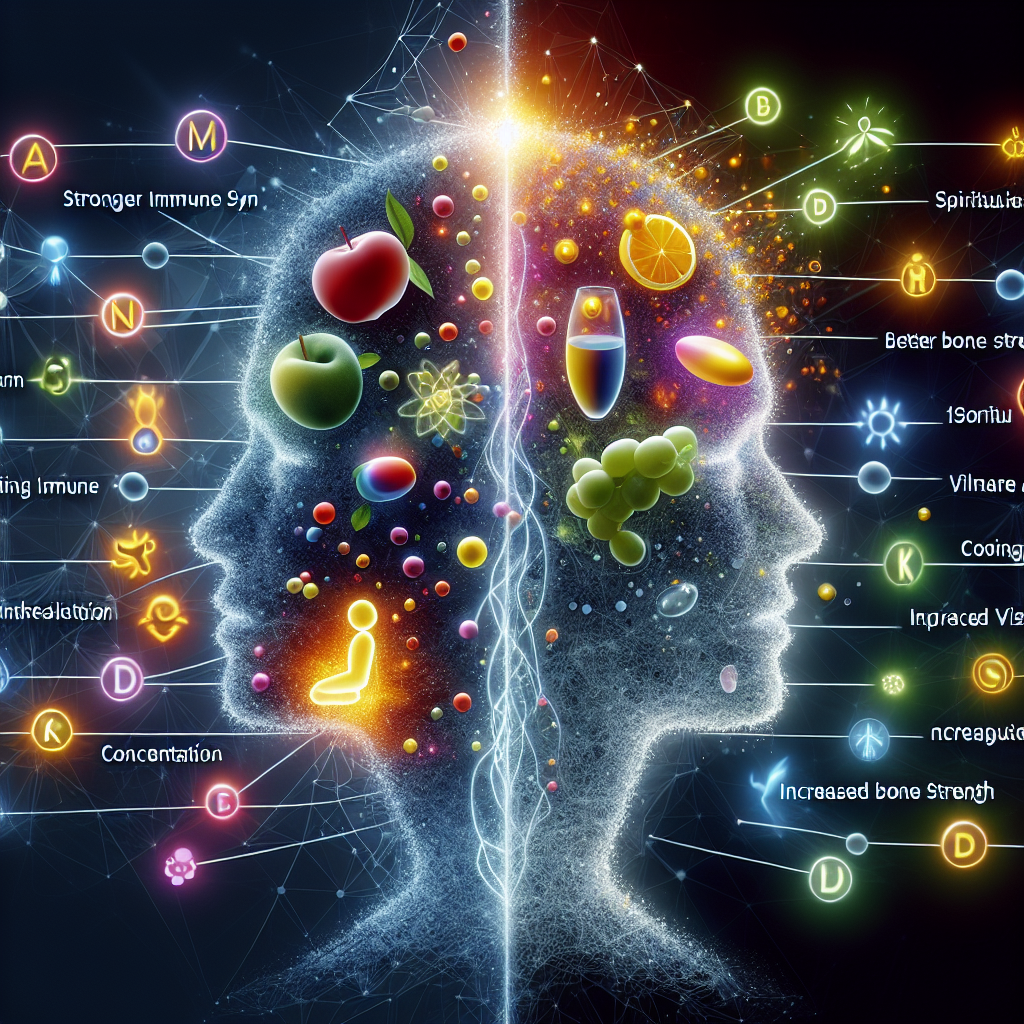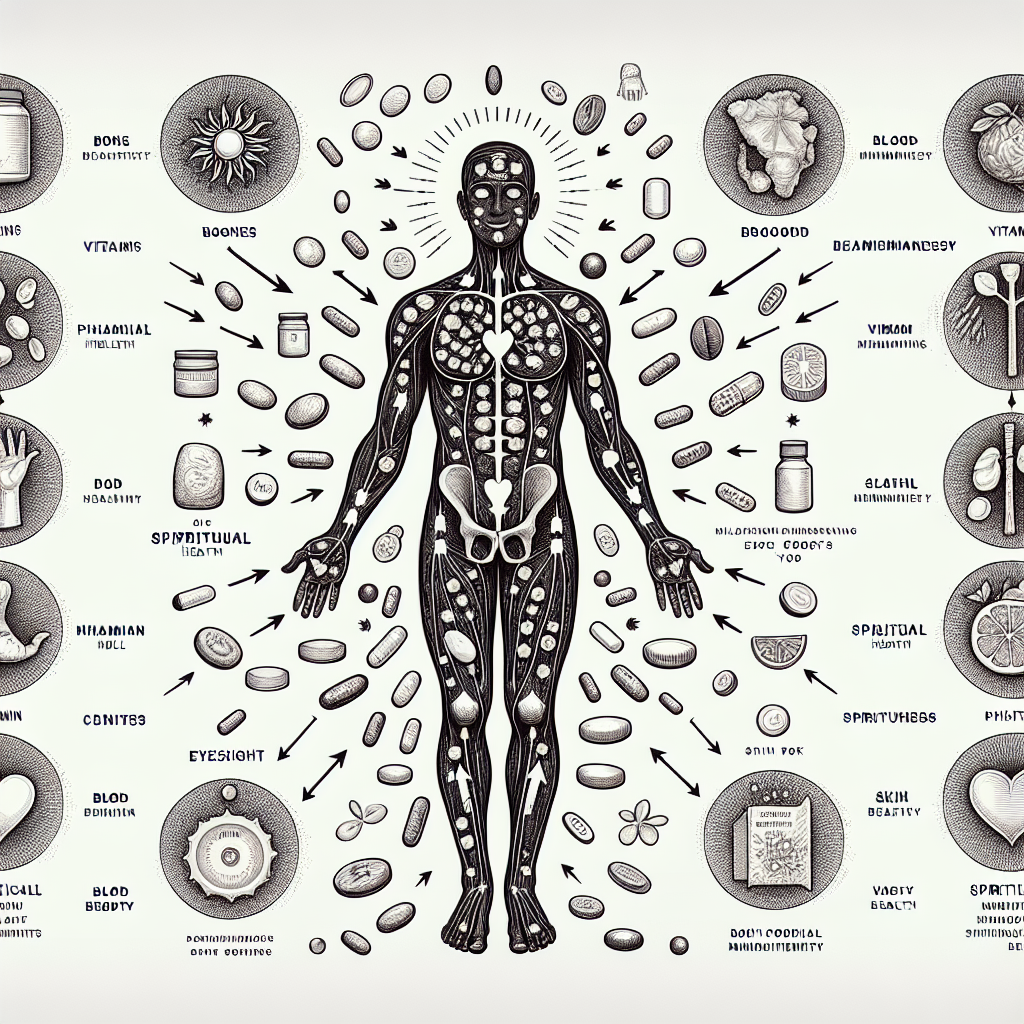How Vitamins Impact Our Spiritual and Physical Health

Discover how vitamins can significantly impact your spiritual and physical health. Learn more about their benefits and how to incorporate them into your daily routine for a healthier, more balanced life. Click here to start your journey towards vibrant vitality.
Exploring the Connection Between Vitamins and Spiritual Wellness
Vitamins are essential nutrients that our bodies need to function optimally. They play a crucial role in maintaining our physical health by supporting various bodily functions, including the immune system, bone health, and energy production. However, the impact of vitamins extends beyond the physical realm. Recent studies suggest that vitamins may also have a profound effect on our spiritual wellness.
The concept of spiritual wellness revolves around the idea of finding purpose and meaning in life, and it is a critical aspect of overall well-being. It involves a sense of connection to something larger than ourselves, and it encompasses values, beliefs, and a sense of purpose. Spiritual wellness is often associated with a state of harmony between the inner self and the external world.
Interestingly, vitamins can play a significant role in enhancing this sense of harmony and connection. For instance, certain vitamins, such as B-complex vitamins, are known to support brain health and cognitive functions. They help in the production of neurotransmitters, which are chemicals that transmit signals in the brain. A healthy brain function is crucial for maintaining mental clarity, focus, and a positive mood – all of which are essential for spiritual wellness.
Moreover, vitamins like Vitamin D, often referred to as the “sunshine vitamin,” have been linked to mood regulation. A deficiency in Vitamin D has been associated with mood disorders such as depression and anxiety. By ensuring an adequate intake of this vitamin, we can help maintain a positive mood, which is conducive to spiritual practices like meditation and mindfulness.
Vitamin C, a potent antioxidant, is another essential nutrient that can impact our spiritual health. It helps combat oxidative stress in the body, which can lead to physical and mental fatigue. By reducing fatigue, Vitamin C can help us stay energized and focused, allowing us to engage more fully in spiritual practices.
Furthermore, the act of consciously incorporating vitamins into our diet can be a spiritual practice in itself. It involves making mindful choices about what we consume, which can lead to a greater sense of connection with our bodies and the food we eat. This mindful eating can enhance our sense of gratitude and appreciation, further promoting spiritual wellness.
However, it’s important to note that while vitamins can support spiritual wellness, they are not a substitute for other spiritual practices. Regular meditation, mindfulness, prayer, or other forms of spiritual exploration remain essential for nurturing our spiritual health.
In conclusion, vitamins play a crucial role in both our physical and spiritual health. They support various bodily functions, promote mental clarity, and help regulate our mood. By making mindful dietary choices, we can ensure an adequate intake of these essential nutrients, thereby promoting both our physical health and spiritual wellness. However, vitamins should be seen as a supportive measure, complementing other spiritual practices rather than replacing them.
The connection between vitamins and spiritual wellness is a fascinating area of exploration, highlighting the intricate interplay between our physical and spiritual selves. As we continue to understand this connection, we can make more informed choices about our diet and lifestyle, fostering a holistic approach to health and well-being.
The Role of Vitamins in Enhancing Physical Health and Spiritual Growth

Vitamins play a crucial role in maintaining our physical health, but their impact extends beyond the physical realm. They also have a profound influence on our spiritual health. This dual role of vitamins in enhancing both physical health and spiritual growth is a fascinating area of exploration.
Vitamins are organic compounds that our bodies need in small amounts to function properly. They are essential for various bodily functions, including growth, digestion, and nerve function. They also play a significant role in preventing and fighting off diseases. For instance, Vitamin C boosts our immune system, Vitamin A is essential for good vision, and Vitamin D helps in the absorption of calcium, promoting bone health.
However, the role of vitamins is not limited to physical health alone. They also contribute significantly to our spiritual well-being. The connection between vitamins and spiritual health may not be as direct or obvious as their role in physical health, but it is equally important.
Spiritual health, in essence, refers to a sense of peace and purpose in life. It involves a connection with oneself, others, and a higher power, whether that be God, the universe, or another form of spiritual entity. It is about finding meaning and purpose in life, which often involves a journey of self-discovery and personal growth.
Vitamins can aid in this journey by enhancing our mental clarity and focus. For instance, B vitamins are known to support brain health and cognitive function. They help in the production of neurotransmitters, which are chemicals that transmit signals in the brain. This can lead to improved mental clarity, which can aid in meditation and other spiritual practices.
Moreover, vitamins can also help in managing stress and anxiety, which often serve as barriers to spiritual growth. For example, Vitamin B5, also known as pantothenic acid, is known for its role in producing stress hormones in the adrenal glands. Similarly, Vitamin D has been linked to mood regulation and the prevention of depression. By helping to manage these mental health issues, vitamins can create a more conducive environment for spiritual growth.
Furthermore, the act of consciously incorporating vitamins into our diet can be a spiritual practice in itself. It involves making mindful choices about what we put into our bodies, which can be a form of self-care and self-respect. This can lead to a deeper connection with ourselves, which is a key aspect of spiritual health.
In conclusion, vitamins play a dual role in enhancing our physical health and promoting spiritual growth. They contribute to various bodily functions and help in the prevention of diseases, thereby maintaining our physical health. At the same time, they enhance our mental clarity and help manage stress and anxiety, thereby promoting spiritual growth. Moreover, the act of consciously incorporating vitamins into our diet can be a spiritual practice in itself. Therefore, a balanced intake of vitamins is essential not just for our physical well-being, but also for our spiritual health.
Understanding the Impact of Vitamins on Our Physical and Spiritual Health
Vitamins are essential nutrients that our bodies need in small amounts to function properly. They play a crucial role in maintaining our physical health by supporting various bodily functions, including the immune system, bone health, and energy production. However, the impact of vitamins extends beyond the physical realm. They also have a profound influence on our spiritual health, affecting our mood, cognition, and overall sense of well-being.
The connection between vitamins and physical health is well-established. Vitamins are involved in numerous biochemical reactions in the body. For instance, vitamin C is a potent antioxidant that protects our cells from damage, while vitamin D is essential for calcium absorption and bone health. B vitamins, on the other hand, are crucial for energy production and the synthesis of DNA and RNA. A deficiency in any of these vitamins can lead to a range of health problems, from fatigue and weakened immunity to severe conditions like scurvy and rickets.
However, the role of vitamins in our spiritual health is a relatively new area of exploration. Spiritual health, in this context, refers to a state of mental and emotional well-being that allows us to connect with ourselves, others, and the world around us on a deeper level. It involves a sense of peace, purpose, and connection that transcends the physical and material aspects of life.
Emerging research suggests that vitamins, particularly the B vitamins, play a significant role in maintaining our spiritual health. B vitamins are known to support brain health and cognitive function. They are involved in the production of neurotransmitters, which are chemicals that transmit signals in the brain. These neurotransmitters influence our mood, thoughts, and behavior, which in turn, affect our spiritual well-being.
For instance, vitamin B6 is involved in the production of serotonin, a neurotransmitter that regulates mood, sleep, and appetite. Low levels of serotonin are associated with depression, anxiety, and other mood disorders. By supporting serotonin production, vitamin B6 can help promote a positive mood and emotional balance, which are key aspects of spiritual health.
Similarly, vitamin B12 plays a crucial role in maintaining the health of nerve cells and the production of DNA and red blood cells. A deficiency in vitamin B12 can lead to neurological problems like memory loss, depression, and cognitive decline, which can disrupt our sense of self and connection with the world.
Moreover, vitamins can also support our spiritual health by enhancing our physical well-being. When our bodies are healthy and functioning optimally, we are better able to engage in spiritual practices like meditation, yoga, and mindfulness, which can nurture our spiritual growth and development.
In conclusion, vitamins play a vital role in maintaining our physical and spiritual health. They support various bodily functions, protect against disease, and promote mental and emotional well-being. By ensuring we get an adequate intake of vitamins, we can support our overall health and well-being, and foster a deeper connection with ourselves and the world around us. Therefore, it is essential to maintain a balanced diet rich in vitamins or consider supplementation under the guidance of a healthcare professional.